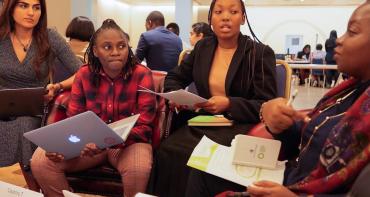It’s not every day I fall back in love in a car park. But it happened while I was filming a short video with several self-confessed carbonphiliacs — including biomimicry guru Janine Benyus and Baroness Patricia Scotland, Secretary-General of the Commonwealth Secretariat.

The video was a breakout task at a conference on regenerative development to reverse climate change. At a time when carbon is increasingly demonised, we were capturing our passion for the element on which all known life is based. Our video’s title was "Bringing Carbon Home."
The message, championed by participants such as Project Drawdown, was that the sooner we pull back the carbon we have dumped into the planet’s atmosphere and reinject it into the soils and forests where it belongs, the better off we will all be.
But, laying my heart bare, carbon wasn’t the object of my renewed passion. Instead, to my surprise, it was an institution launched back in 1949 (the year I was born). Early on in the event hosted by the Commonwealth Secretariat at Marlborough House, the former royal palace in whose car park we shortly would be filming, I impolitely told Baroness Scotland that my expectations had been low.
The Commonwealth’s star seemed to fade in recent years, so I failed to notice the extraordinary impact of the organization’s behind-the-scenes lobbying captured in 2015’s Commonwealth Leaders’ Statement on Climate Change, targeted at the COP21 summit in Paris. True or not — and she has a well developed sense of humour — Baroness Scotland said they put pins on all the COP21 seats, insisting delegates couldn’t sit down until they had voted in the right way.
Several Americans at the event, convened under a ceiling pulsing with bloodthirsty images of the Battle of Blenheim, hadn’t known there was a Commonwealth. As background: It comprises 52 nations and is home to 2.2 billion people — 60 percent of them younger than 30. A fair few members are island states, acutely nervous about the growing risks of climate change, particularly storms (such as tropical storm Erika, which devastated Dominica last year) and rising sea levels.
I knew that the Commonwealth promotes democracy, the rule of law, human rights, good governance and social and economic development. But I didn’t know that it had been banging the drum on climate change since the late 1980s — nor that the organization now has something of a firebrand as its secretary-general.
With the Brexit vote raising question marks over Britain’s future global role, could we see a welcome reawakening of interest in the Commonwealth among thoughtful citizens, politicians and business leaders?
In retrospect, it was my good fortune to grow up in parts of the unravelling British Empire, particularly Cyprus. As the old order dissolved, Britain created the Commonwealth to maintain close links with former colonies. Over the years, I have benefited immensely from this fact.
As I have repeatedly circled the planet, I have found huge reservoirs of affection in places as disparate as South Africa and Singapore, Canada and India, Cyprus and Australia. But as I focused in on business, my interest in the Commonwealth waned and my involvement with the European Union waxed.
Then, the morning this Commonwealth event kicked off, I read the media coverage of WWF’s latest Living Planet index survey. I had been briefed by WWF several weeks earlier, but was again stunned to see that between 1970 and 2012 wildlife populations had fallen by a mind-numbing 58 percent — with no sign that the decline is slowing.
When I arrived on the conference’s first day, and we were asked to explain who we were, I introduced myself as a "failed environmentalist." Despite my having exerted every effort since the early 1970s, the world still seems locked into an exponential trajectory towards some form of global breakdown.
Not surprisingly, some delegates took me for a rabid pessimist. I had to explain that I was born — and remain — an optimist, under certain conditions. Among those conditions is rigorous scientific analysis of what’s happening in the real world. Unfortunately, the data show that we are indeed changing the world, as so many people now insist they want to do, but in ways that can only undermine the prospects of future generations.
My hope, if not exactly optimism, flows from the fact that our species generally addresses systemic crises only when backed into a corner. With global environmental change, we have backed ourselves into the mother of all corners.
My mood also had experienced uplift a week earlier in Düsseldorf, Germany, where I appeared alongside Bertrand Piccard of the Solar Impulse at an event organized by Covestro.
Our focus: the pivotal challenge of boosting the "carbon productivity" of companies, supply chains and economies. Conclusion: We need a global carbon productivity movement to promote deeper understanding of the wonders and vital importance — not just risks — of carbon innovation and engineering across our economies.
Along the way, we must find new ways to bring carbon home, to where nature intended it to be. But to achieve critical mass for systemic change we must disrupt silos across the sustainability industry, converging and simplifying our language, and co-evolving a stronger shared narrative. That’s what we are attempting with Project Breakthrough, alongside the U.N. Global Compact.
Since leaving Marlborough House, one image sticks in my mind: a variant of the "Keep Calm" poster, advising, "Keep Calm — We’re Experiencing A Paradigm Shift." And one idea that hovers alongside it is the possibility that this unique constellation of 52 nations may be evolving, as some participants concluded, into the world’s leading "impact bloc." Now that really would be something to write home about.
This article by John Elkington, Chairman and Chief Pollinator of Volans Ventures Ltd, was first published on GreenBiz.com.



